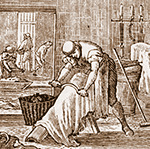from Colonial Families of Philadelphia, Volume 2
vy John Woolf Jordan
John Grubb, the most prominent of all these early settlers of the name and the ancestor of the now numerous family of the name in Pennsylvania, Delaware, New Jersey and elsewhere, is said to have been born in Cornwall, England, 1652, and to have come to the Delaware river, in the ship Kent, 1677. He obtained a grant of land at Upland, now Chester, Pennsylvania, 1679, and at Grubb’s Landing, New Castle county, now Delaware, 1682, and subsequently elsewhere, in both the Lower Counties, as Delaware was then known, and in Pennsylvania...
John Grubb, the early settler on the Delaware, who was born in Cornwall, 1652, and whose wife was Frances Vane, of Kent county, England.
This John Grubb, son of John and Helen (Vivian) Grubb, the pioneer settler, with William Penn, Richard Buffington, and others, signed the Plan of Government for the Province of West Jersey, bearing date March 3, 1676, and at the age of twenty five years sought his fortune and a career in the New World. Whether he emigrated direct from Cornwall is not certainly known. As his father was buried in 1667, in the family Churchyard at Potterne, Wiltshire, it is possible that John may have lived in Wiltshire at about the time he came to America...
During his thirty years of rugged and arduous pioneer life on the Delaware he proved himself to be a man of enterprising, vigorous and sterling qualities, and of practical business ability. He was prominent and influential in his section, and successful in his career as legislator, magistrate, farmer and leather manufacturer. He not only cleared and cultivated the various tracts of land he owned, but he also, in practical recognition of the needs of a pioneer people, erected a tannery near Grubb’s Landing and was one of the earliest manufacturers of leather in Penn’s new Province. He also, conformably to the provisions of Penn’s very practical law and the custom of the most prominent settlers, had each of his sons taught a practical trade, in order that they might be prepared for every contingency incident to those early times.
In November, 1679, a tract of three hundred and forty acres of land on Chester creek, near Upland, now Chester, Pennsylvania, was conveyed to him and Richard Bufiington. He with this Richard Bovington or Bufiington, with whom he was closely associated, were defendants in a suit brought to the Court at New Castle, 1680, by Robert Wade, in reference to their tenancy or purchase of land belonging to Wade, and other matters in dispute.
On September 19, 1682, Stockdale’s Plantation of eight hundred acres in Brandywine Hundred, New Castle county, was surveyed to John Grubb, though a portion of it was in dispute between him and the Proprietary Government for a number of years, as shown by the correspondence of James Logan, Secretary of the Proprietors. It was located on Naaman’s creek and the Delaware river, and came to be known as Grubb’s Manor Lands. On May 9, 1691, there was surveyed to him by virtue of a warrant dated April 26, 1684, four and a half acres for a tan yard, on which he erected a tannery.
At the Court at Chester, January 6, 1684, he made a deposition in reference to a matter then pending, and is mentioned as "about thirty-two years of age." He was commissioned a Justice of New Castle county, May 2, 1693, and was elected a member of the Colonial Assembly, 1692-98-1700.
On June 3, 1698, Alice Gilpin, widow of Thomas Gilpin, conveyed to him one hundred and eight acres of land near Grubb’s Landing, on the Delaware, and in 1707 John French, Sheriff, conveyed to him one hundred and seventy-five acres in Brandywine Hundred. In 1703-4, he purchased land at Marcus Hook, Chichester township, Chester county. Pennsylvania, where he was living at the time of making his will in which he is named as of the county of Chester.
He died at Marcus Hook, March, 1708, in his fifty-sixth year, and was buried there in St. Martin’s Churchyard. He was not a Quaker, but like his ancestors adhered to the Church of England. His will was proved, filed and recorded in the Register of Wills’ Ofiice at Philadelphia, March 26, 1708, but as he was a large landowner in New Castle county a copy thereof was filed in the Wills’ Office at New Castle, Delaware.
Frances (Vane) Grubb, of Grubb’s Landing, married (second) Richard Buffington, her first husband’s friend and associate, as has been shown by deeds signed by them and by other circumstances, and thereafter lived in Bradford township, Chester county, where she died, prior to 1721.


